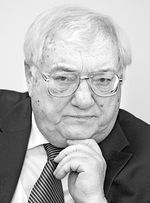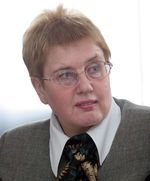Ukrainians are accepted to the World Academy of Art and Science
The secretary general of the World Academy of Art and Science (WAAS) Zbigniew Bochniarz sent a letter to The Day. “I am very happy to share the news that the outstanding Ukrainian scientist, writer, and diplomat Yurii Shcherbak was accepted to the Academy,” Bochniarz writes. “And we are delighted to see him among the 650 scholarship holders of our Academy, and we hope to learn more about Ukraine and this part of the world.” Yurii Shcherbak was nominated by the famous econoist and public figure Bohdan Hawrylyshyn and Bochniarz himself. Maria Zubrytska, vice president of the Ivan Franko Lviv National University, was also accepted to the Academy.
YURII SHCHERBAK:
UKRAINE HAS TO APPEAR IN THE EUROPEAN CONTEXT MORE OFTEN
 We congratulated Shcherbak upon receiving this honorary title over the phone. “Oh wow, you know about that already!” replied he cheerfully.
We congratulated Shcherbak upon receiving this honorary title over the phone. “Oh wow, you know about that already!” replied he cheerfully.
What do you think your activity at the WAAS will be like?
“I took part in one very interesting conference, organized by the Academy last year in Dubrovnik (Croatia). It was on the future of the humankind and matters of nuclear security. I had a report on this topic based on the Chornobyl experience. But the main thing is that the conversations about the possibility of the nuclear war started on a very high level again. The conference urged to create non-nuclear zones and constantly expand them, since now the risk of the nuclear war is high. The Academy carries out a noble mission, we need to think about our future seriously. Often, we get immersed into routine details, petty political fights, and do not even notice that there are principal issues that arise before entire nations and countries, including Ukraine.
“Ukraine has to appear in the European context more often. And not only on the level of our conversations with Poland, Lithuania, the European Union. The voice of Ukraine should be heard around the world. That is why I decided that representation of Ukraine in the WAAS should be consolidated. Now I am thinking about the way to popularize the activity of the WAAS in Ukraine. Serious matters are discussed at the Academy, from the social capital (workforce) and youth issues to the future and present-day innovations. In general, they stand for the innovational society, which is a very actual topic for us.”
At the beginning of Ukraine’s independence, all nuclear weapons were eliminated. So how can Ukraine join the non-nuclear policy process today?
“Two conferences took place in Washington DC and Seoul. In Washington DC Ukraine stated that Ukraine gave away its stock of highly enriched uranium, though it was not a threat to the global nuclear security. Let me remind that Japan owns about 20 to 40 tons of plutonium – this amount can blow up the whole planet. It is known that Ukraine was an active participant of nuclear disarmament. It created a rather effective control system over the transportation of radioactive materials. Ukraine improved legislation in this area. Now we are a non-nuclear peaceful nation recognized by the global community. At the same time, we need to think about the processes that happen around the Black Sea. I, for instance, have no idea how the Black Sea Fleet [of the Russian Federation. – Ed.], which is now deployed on the territory of Ukraine, will disarm. Besides, our neighbor declared a doctrine that gave it the right to launch nuclear missiles first. There are a lot of such dangers, let alone Iran and its conflict with Israel; it threats to use nuclear weapon in the Middle East. There is also North Korea… By the way, there is always a chance that other regimes might want to create nuclear weapons of their own. In the diplomatic circles it is said that Shiite weapon (Iranian nuclear weapon) will cause a reaction from the Sunni countries, which will want to have nuclear weapons too. These weapons are old and the technologies of their production are not a secret anymore. It is absurd because their destruction force is horrible. However, many countries think their prestige will grow if they possess such weapons. When speaking at the conference, I stressed that we gave away our nuclear weapon voluntarily. Everyone accepted this with understanding, but we still need to stress this role of Ukraine. This is an unprecedented fact, when a country that had nuclear weapons gave them all away.”
The WAAS has a motto: “Leadership in thought that leads to action.” Do you think that today Ukraine has enough individuals that can be leaders and think independently, thus earning respect towards Ukraine from other countries?
“We have spiritual leaders, our outstanding writers like Ivan Dziuba or Lina Kostenko. We have prominent religious leaders like Patriarch Filaret and Liubomyr Huzar. We have scholarly leaders…
“However, in the politics, a harsh anti-leader selection is going on, and people with leadership qualities are restrained from occupying high governmental positions. This is done to please a group of people who have real power in this country. However, their leadership skills raise doubts. In my opinion, they are just incapable to face the challenges of the 21st century, because all of them have Soviet background, they come from the industrial era of the 1940s-1950s, and they have authoritarian thinking. They do not think about the future of the people and the state, they care only about their personal wealth, and they do their best to protect it. Here, we have no leadership.
“Nowadays, there are not as many leaders in Europe either. There have been few worthy politicians after Margaret Thatcher and Ronald Reagan. They are not borne by the thousand, and hundreds of good politicians do not come to rule. Everything depends on the epoch. But I am convinced that the time is near when events that will change the situation in our country will take place and new, absolutely unexpected leaders will appear. Perhaps, they are students at the moment, but they will be there. I am sure that Europe will overcome its crisis too and new leaders will appear there as well. All this is a matter of historical moment.”
By Ihor SAMOKYSH, The Day
MARIA ZUBRYTSKA:
HUMANISTS CAN AND HAVE TO HELP THE SOCIETY
 “The task of the WAAS is very simple: discussions, debates, expert opinions, recommendations on those problems that draw special response in various societies and in the global community in particular. That is, those are interdisciplinary discussions. We meet during counsels, seminars, Skype conferences, etc. We are correspondents at online and printed media. The latest WAAS world symposium, which took place in Podgorica (Montenegro), was on the economic and financial crisis, on the vision of this crisis from different points of view: humanistic, artistic, and economic. Even such radical matter as, for example, the responsibility of the Nobel Prize in Economics laureates for the economic crisis, or should the responsibility of separate individuals and institutions that provided expert assessments be discussed. The second matter was especially close to me, humanities as they are, human sciences that are going through extremely hard times because of the financial crisis. For example, there was a discussion about PgD students who cannot find a job. The demand for humanists, philosophers and culture experts in particular, decreased. They were pushed aside. Why? Can this have caused the financial crisis? The majority of the Podgorica symposium participants said that we should go from theoretical aspects to practical ones, that we have to open our windows, look out and see what society needs from us, in what ways we can help the society.
“The task of the WAAS is very simple: discussions, debates, expert opinions, recommendations on those problems that draw special response in various societies and in the global community in particular. That is, those are interdisciplinary discussions. We meet during counsels, seminars, Skype conferences, etc. We are correspondents at online and printed media. The latest WAAS world symposium, which took place in Podgorica (Montenegro), was on the economic and financial crisis, on the vision of this crisis from different points of view: humanistic, artistic, and economic. Even such radical matter as, for example, the responsibility of the Nobel Prize in Economics laureates for the economic crisis, or should the responsibility of separate individuals and institutions that provided expert assessments be discussed. The second matter was especially close to me, humanities as they are, human sciences that are going through extremely hard times because of the financial crisis. For example, there was a discussion about PgD students who cannot find a job. The demand for humanists, philosophers and culture experts in particular, decreased. They were pushed aside. Why? Can this have caused the financial crisis? The majority of the Podgorica symposium participants said that we should go from theoretical aspects to practical ones, that we have to open our windows, look out and see what society needs from us, in what ways we can help the society.
“We have to promptly respond to the problems of the local community and give expert opinions. For example, on poverty. Or child labor. When we eat chocolate, we do not even think that children in Madagascar and other African countries do not go to school, because they collect cocoa beans. Why don’t 160 million of children have enough food, in what ways can this asymmetry between poverty and excessive luxury be balanced? After the discussions, we drafted a Memorandum on the Humanist’s Missions, which will be sent to the EU leadership; this is a document on the social responsibility of the intellectual in a wide context.
“As far as the expansion of my powers goes, the first thing I did was share impressions of all those contacts and problem discussion. You know, the Academy is first of all a unique opportunity to meet various people from academic milieu – in particular, those who face the same challenges. So I can hear their opinion directly. I was interested to learn how the problems of education and science are solved in Romania, Brazil or India. For instance, to hear about Bangalore’s success and analyze why Ukraine has nothing of this kind. In short, this is the sort of know-how which should be expanded.”
By Tetiana KOZYRIEVA, The Day, Lviv
The Day’s FACT FILE
The World Academy of Art and Science (WAAS) was started in 1960 by a group of outstanding scholars. During the years of its existence WAAS has tried to address the most global issues, serve a forum for debate on mankind’s vital problems, and promote policies which support universal human rights and serve the interests of humanity. Now the Academy consists of 650 members from various cultures, nationalities and spheres of science, chosen for their interdisciplinary perfection in natural and social sciences, as well as for humanism and professional qualities.
Випуск газети №:
№28, (2013)Рубрика
Day After Day





